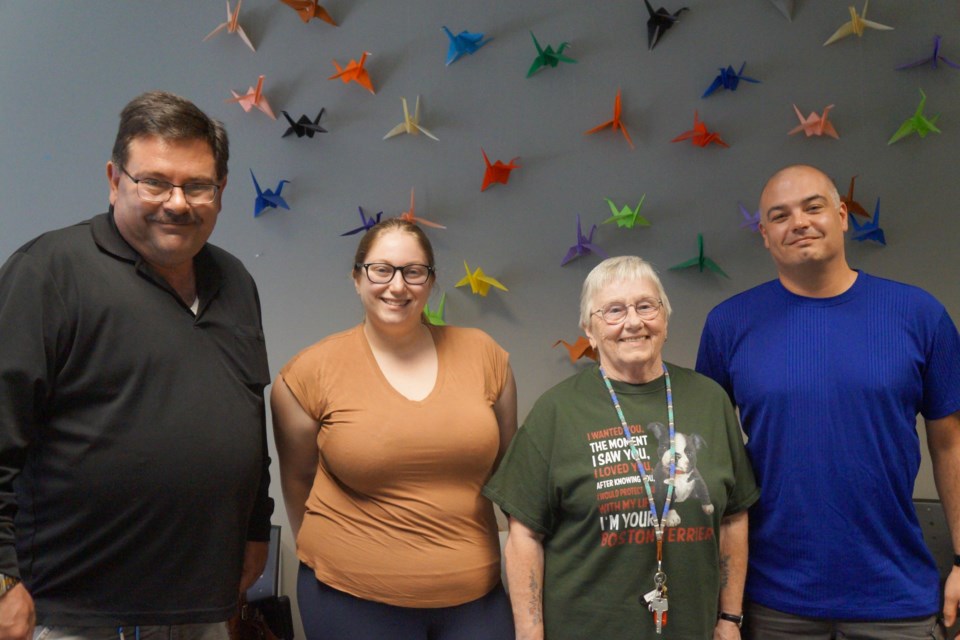In 1998, the Northern Initiative for Social Action (NISA) was born. Now, 25 years later, it is a welcoming place for all those who are facing mental health challenges.
And right there, for the entire journey, was Alex Radway.
Now considered the face of NISA, Radway told Sudbury.com that the idea behind it began as a way for people like him, those with mental health challenges, to have an organization that would be run by and for others with the same lived experience.
Radway was leaving the Canadian Mental Health Association building downtown that year, having learning that the program he had been attending was cancelled. As he left, he saw a poster on a bulletin board.
“On the board it said ‘PanNorthern Research is looking for volunteers, may lead to paying job’.” He rhymed it off as if he was looking at the old poster today.
Radway went in for an interview, and met Karen Rebeiro, Derek Day and Bob Seminyak, the founders of NISA.
He said they wanted to provide a place for “members and consumers of the mental health system,” to do therapeutic programming like occupational and vocational programs, “and reduce the revolving door effect at the hospital at the Algoma (now Kirkwood Place).”
Enough people volunteered for the research project that the group took on the name the Umbrella Tree Corporation, said Radway. “And then six months later, we were NISA.”
Now, all these years later, NISA offers an array of programming and it is all created by program directors who understand exactly what NISA members are going through, because they’ve been there themselves.
Shirley Rajotte, older adult peer support program co-ordinator at NISA, said lived experience can help them meet people “where they are at” in their journey, and tailor their services to best. “We want people to come in and feel at home and feel welcome,” said Shirley Rajotte. “We don't want a clinical type setting.” She said that is part of what lived experience can bring: understanding.
Now located at 36 Elgin Street, NISA features programming specifically designed to offer healing, fun and community at the same time.
The Writers’ Circle and Open Minds Quarterly allow members to explore their own stories and histories in writing. In 2011, NISA began operating the Regional Warm Line (1-866-856-9276). The Warm Line provides telephone support by peers for peers across Northeastern Ontario. It is open every evening, 365 days a year.
The Artist’s Loft is open for anyone who wants to create, and with donated materials to use, they can either keep what they make or sell to others. Those pieces are displayed throughout NISA. There is also the Warm Hearts, Warm Bodies program which uses donated fabric and textiles to create quilts, blankets and comforters for people within the community who are in need.
For those who like to work with their hands, but are looking for something less crafty, the Northern Computer Recycling Depot (NCRD) is a program that teaches members to repair and refurbish donated computers to then sell them to individuals or businesses at an affordable price.
Then, there are the peer support programs.
Peer supporters have encountered a mental health and/or substance use issue and then use these experiences to help others, share parts of their lived experience and recovery journey in their role as a volunteer or staff person. Peer support is an evidence-based model and is highly successful at NISA.
There are support groups, peer support for the supporter and one-to-one sessions, but anyone in need of help can also just come and really, hang out.
There is also a group specific to older adults, run by Rajotte. Many older adults grew up in a time when mental health was not to be spoken of, something to “get over.”
She said that the majority of her time is spent telling people it’s okay to feel like you’re not okay.
That’s what makes NISA special, said Radway, allowing people with mental health challenges process, heal and make their lives better in innumerable ways.
“I trust the staff here because they have been through the same thing,” he said. He even credits NISA for teaching him what a mental health day is. “If you haven't slept and you're having those symptoms, you should do a mental health day,” Radway said the staff told him. “And I asked ‘what is that’?” The staff told him it was like a sick day, but for your mental health rather than your physical health. “It was the first time I took a mental health day.”
Rajotte said when new members come in, it is “amazing” to watch.
“To watch their growth when they started off sitting in a corner, then moved a little closer, a little closer, now they're taking part in the groups,” she said. “To sit back and watch that growth makes you feel like you have accomplished something.
Radway also loves the feeling of being a part of a member's journey. “That's why I try to get to know people, because everybody has their own story and their own learning experience and their own growth,” he said. “It's magical sometimes.”
If you would like to support the programming at NISA, they take monetary donations as well as donations to their crafting programs. As well, they are always looking for coffee. Lots and lots of coffee.
If you have ever used mental health services and would like to become a member at NISA and learn from their experiences, or work with the programming, it is completely free of charge.
“It is free to come here,” said Radway. “If you want to succeed, be successful with your mental health, this is a great place to start.”
Jenny Lamothe covers vulnerable and marginalized communities for Sudbury.com
